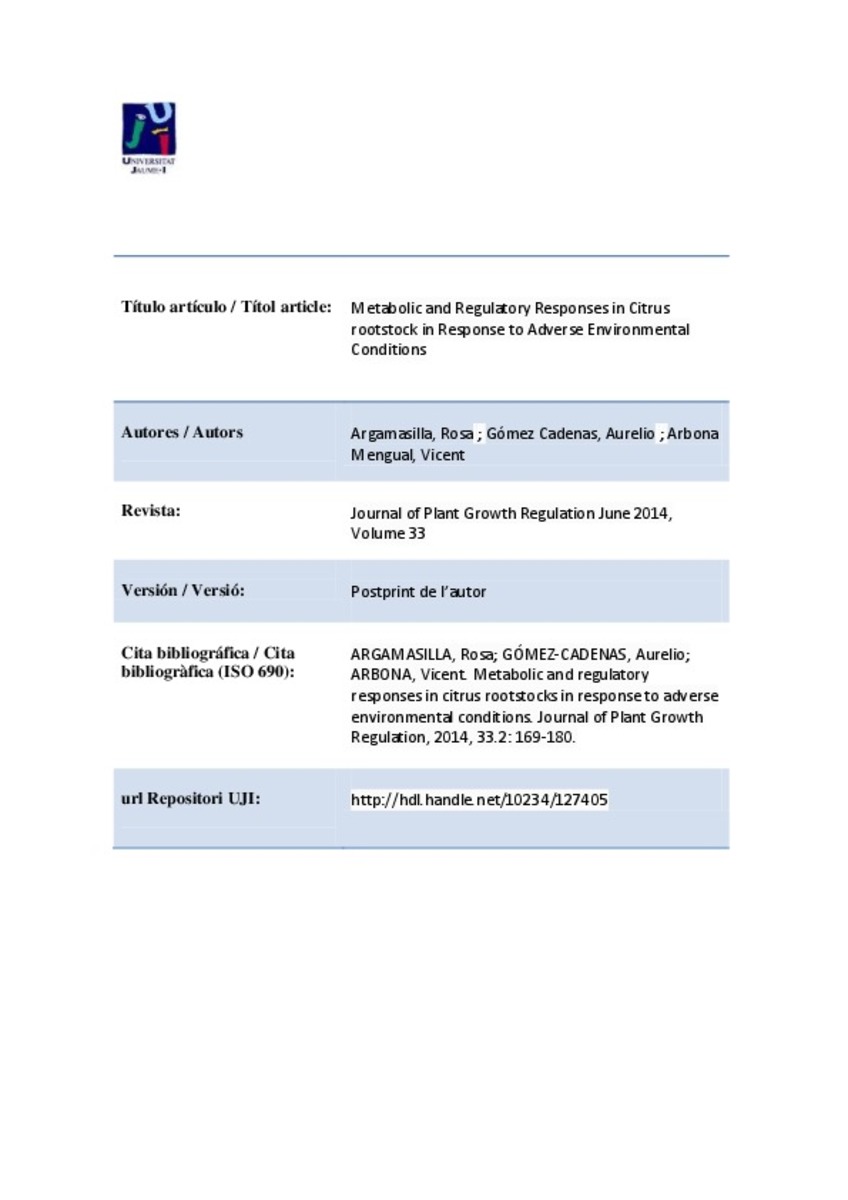Mostra el registre parcial de l'element
Metabolic and Regulatory Responses in Citrus rootstock in Response to Adverse Environmental Conditions
| dc.contributor.author | Argamasilla, Rosa | |
| dc.contributor.author | Gomez-Cadenas, Aurelio | |
| dc.contributor.author | Arbona, Vicent | |
| dc.date.accessioned | 2015-07-13T10:36:42Z | |
| dc.date.available | 2015-07-13T10:36:42Z | |
| dc.date.issued | 2014-06 | |
| dc.identifier.citation | ARGAMASILLA, Rosa; GÓMEZ-CADENAS, Aurelio; ARBONA, Vicent. Metabolic and regulatory responses in citrus rootstocks in response to adverse environmental conditions. Journal of Plant Growth Regulation, 2014, 33.2: 169-180. | ca_CA |
| dc.identifier.uri | http://hdl.handle.net/10234/127405 | |
| dc.description.abstract | In response to adverse environmental conditions, plants modify their metabolism to adapt to the new conditions. To differentiate common responses to abiotic stress from specific adaptation to a certain stress condition, two citrus rootstocks (Carrizo citrange and Cleopatra mandarin) with a different ability to tolerate stress were subjected to soil flooding and drought, two water stress conditions. In response to these conditions, both genotypes showed altered root proline and phenylpropanoid levels, especially cinnamic acid, which was a common feature to Carrizo and Cleopatra. This was correlated with alterations in the levels of phenylpropanoid derivatives likely involved in lignin biosynthesis. In the regulatory part, levels of both stress hormones abscisic acid (ABA) and jasmonic acid (JA) decreased in response to soil flooding irrespective of the genotype’s relative flooding tolerance, but, on the other hand, the concentration of both metabolites increased in response to drought, showing a transient accumulation of JA after a few days and a progressive pattern of ABA increase. These responses are probably associated with different regulatory processes under soil flooding and drought. In addition, alterations in indole acetic acid (IAA) levels in citrus roots seemed to be associated with particular stress tolerance. Moreover, both genotypes exhibited a low degree of overlap in the metabolites induced under similar stress conditions, indicating a specific mechanism to cope with stress in plant species. Results also indicated a different metabolic basal status in both genotypes that could contribute to stress tolerance. | ca_CA |
| dc.format.extent | 11 p. | ca_CA |
| dc.format.mimetype | application/pdf | ca_CA |
| dc.language.iso | eng | ca_CA |
| dc.publisher | Springer Verlag | ca_CA |
| dc.relation.isPartOf | Journal of Plant Growth Regulation June 2014, Volume 33 | ca_CA |
| dc.rights | © Springer International Publishing AG | ca_CA |
| dc.rights.uri | http://rightsstatements.org/vocab/InC/1.0/ | * |
| dc.subject | abiotic stress | ca_CA |
| dc.subject | drought | ca_CA |
| dc.subject | metabolomics | ca_CA |
| dc.subject | plant hormones | ca_CA |
| dc.subject | phenylpropanoids | ca_CA |
| dc.subject | soil flooding | ca_CA |
| dc.title | Metabolic and Regulatory Responses in Citrus rootstock in Response to Adverse Environmental Conditions | ca_CA |
| dc.type | info:eu-repo/semantics/article | ca_CA |
| dc.identifier.doi | http://dx.doi.org/10.1007/s00344-013-9359-z | |
| dc.rights.accessRights | info:eu-repo/semantics/openAccess | ca_CA |
| dc.relation.publisherVersion | http://link.springer.com/article/10.1007/s00344-013-9359-z | ca_CA |
Fitxers en aquest element
Aquest element apareix en la col·lecció o col·leccions següent(s)
-
CAMN_Articles [566]







